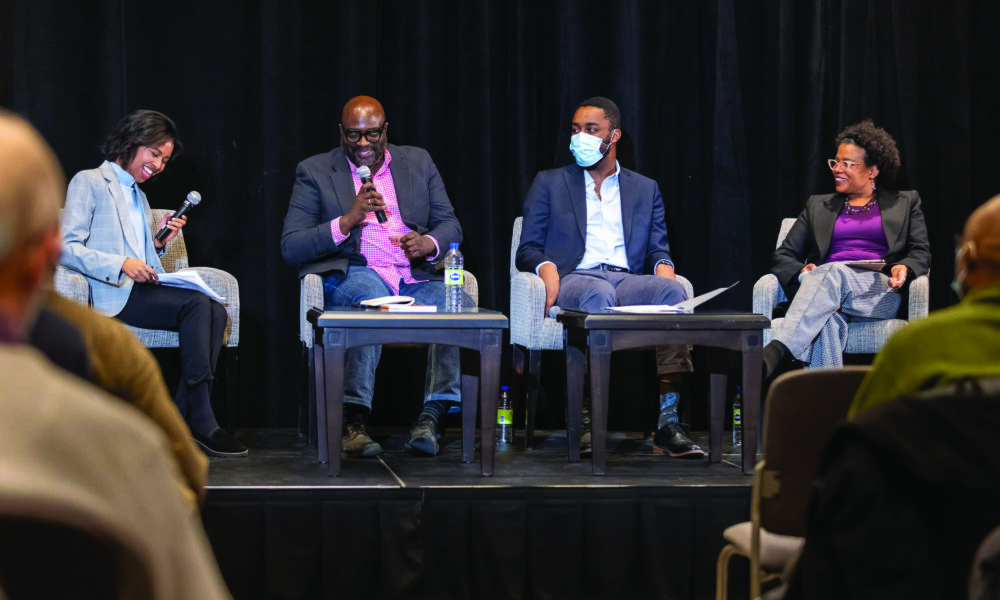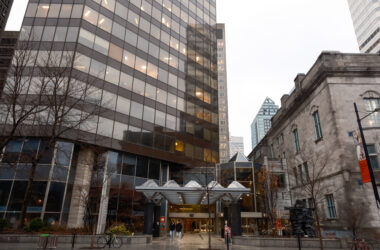Content Warning: Mention of racist violence
The McGill Institute for the Study of Canada (MISC) brought three McGill academics together for the “Anti-Black Racism in Canada and Beyond” panel at Centre Mont-Royal on the evening of Feb. 2. The event delved into entrenched systems of power and oppression that limit Black participation in academia and in everyday life across the country.
Hosted by Holly Cabrera, CBC journalist, BA ‘19, MIst ‘22, and former editor at The McGill Tribune, the panel featured David Austin, a course lecturer at MISC and professor at John Abbott College; Terri E. Givens, professor of political science at McGill and the Provost’s Academic Lead and Advisor on McGill’s Action Plan to Address Anti-Black Racism; and Tari Ajadi, an assistant professor of Black politics at McGill.
The sold-out hybrid event began a few minutes after 5 p.m. with an introduction and land acknowledgment by MISC director and professor of political science Daniel Béland.
Cabrera opened the panel by addressing recent examples of police brutality: The murders of Nicous D’Andre Spring, a 21-year-old Montreal man who was killed by correctional officers while illegally detained at Bordeaux Prison in Montreal, and Tyre Nichols, a 29-year-old man who was killed by five Black police officers in Memphis, Tennessee.
“You’ll recall that many have referred to 2020 as a moment of racial reckoning—and since police murdered George Floyd, we’ve seen more beatings, more book clubs, and more backlash,” Cabrera said. “So it bears repeating: Anti-Black racism has existed for centuries, and Black people continue to resist it.”
Austin added that defining the capitalist roots of anti-Black racism is crucial if we are to dismantle it. All panellists were clear on the historical connection between capitalism and the subjugation of Black people—from the transatlantic slave trade to mass incarceration.
“I really believe change cannot come about until we all are willing to have that vulnerability and say, I am a part of this system,” Givens said. “Nobody wants to admit that they are part of a racist system, but we are […], and that it’s […] part of the structures of white supremacy that are built into the system of capitalism that we live in today.”
Next, Cabrera broached the question of performativity in institutional equity, diversity, and inclusion (EDI) initiatives. Though EDI initiatives seek to increase the representation of people of colour within organizations, Ajadi explained, they cannot change what an organization was originally conceived to do.
“EDI is a tool of management, it helps you to make your organizations better. That’s not liberation,” Ajadi said. “Right? That’s not what structural change looks like. To me, it looks like changing the organization so that the organization achieves its goals in a more efficient or effective way.”
When Cabrera asked whether the institution of policing is salvageable, the panellists agreed that reform efforts have not gone nearly far enough.
“As the author of a report on defunding the police, you can imagine what my response is,” Ajadi quipped. “But I’d rather flip the question—what does policing do well?”
Austin pointed to policing as a prime example of how large-scale structural change is needed to address institutionalized racism.
“That’s the only way we can actually understand what happened in Memphis,” Austin said. “We’re talking about structural power, and how even with the representation of more Black faces in high places, the structures of power are not transformed.”
At McGill, there were 14 Black tenure or tenure-track faculty members out of approximately 1,800 in 2021. McGill pledged to increase this number to 40 by 2025, and 85 by 2032. Over the past two years, 28 Black tenured or tenure-track professors were appointed. Black students make up 4.6 per cent of the student body according to the Student Demographic Survey.
“I think people want to say, ‘Oh, we’ve made progress [….] We’ve done enough for Black students at McGill,’” Givens said. “The point is: Have we created an environment where students want to come to McGill, where Black faculty feel like they belong and can thrive and flourish? Have we created an environment that makes McGill look like a place people want to be, period?”










